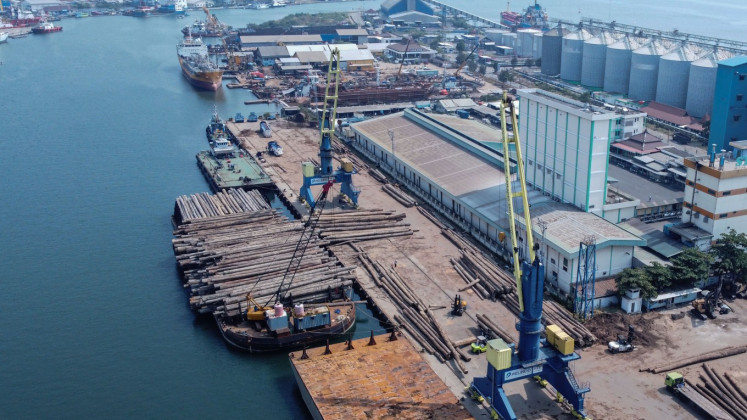Popular Reads
Top Results
Can't find what you're looking for?
View all search resultsPopular Reads
Top Results
Can't find what you're looking for?
View all search resultsEditorial: Threats to sustainable growth
Indonesia, already enjoying the world’s highest economic growth after China, has remained one of the most favorite places for foreign direct and portfolio investment
Change text size
Gift Premium Articles
to Anyone
I
ndonesia, already enjoying the world’s highest economic growth after China, has remained one of the most favorite places for foreign direct and portfolio investment. Meanwhile the European economy is predicted to contract this year and the economic recovery in the US is weakening.
Indonesia saw a net inflow of about US$1.3 billion in bonds last month, compared with a net outflow of $540 million in August, according to Standard Chartered.
The Investment Coordinating Board (BKPM) announced last week that realized investment in the third quarter rose by 25 percent from a year earlier to about $8.52 billion, of which around 70 percent was foreign investment.
Most of the foreign investment was ploughed into mining and other resource-based ventures; and into the chemical, pharmaceutical and telecommunications industries.
This rosy outlook prompted BKPM chief Chatib Basri to be highly optimistic that the annual growth rate for this year could still reach 6.3 percent, higher than most analysts’ forecasts of around 6 percent. The basic question though is whether high growth rates can be sustained over the long term in view of crumbling infrastructure, a pervasively corrupt government bureaucracy and an utterly inadequate institutional capacity at regional administrations.
Standard Chartered, in its latest research report titled Economic Reform: The Unfinished Agenda, warned that Indonesia needed to do much more to slash bureaucracy and build infrastructure if it wants the high-growth party to continue.
Reform is the key to unlocking faster economic growth, as without reform, the economy could stuck on a low-growth trajectory. Unfortunately, a slew of rosy reports on Indonesia’s economic outlook over the past few months seems to have led the government into complacency.
Standard & Poor’s, the only major credit rating agency that has persistently refused to give Indonesia an investment-grade rating, came out with a more somber assessment.
S&P’s latest report on Indonesia underlined market perceptions that the government’s reform agenda has stalled due to a lack of policy initiatives to promote long-term growth and a string of policy measures that appear to be anti-foreign investor, ad hoc in nature and not conducive to the efficient allocation of resources.
Indonesia’s former finance minister Sri Mulyani Indrawati, who is currently a World Bank managing director, came out with even more fundamental suggestions, warning that the high growth, which has been driven mainly by domestic demand, will not be sustainable if income inequalities widen. The blunt fact is that income inequality in the country has been perceived to have widened. Most indicators have validated those perceptions.
Sri Mulyani told The Jakarta Post in a recent interview that since a domestic-consumption-driven economy usually relies on middle- and high-income urban people, there are big risks of inequality increasing. It is therefore imperative for the government to implement policies designed to maintain the purchasing power of the poorer segments of society so that the gap between the rich and the poor does not widen.
Needless to say, widening income inequality could become a source of political and social unrest that could consequently stymie investment and hamper economic growth.
The experience of many developed countries shows that greater opportunities, tolerance of diversity, social mobility, and commitments to fairness and democracy derive directly from economic growth. But these values could easily vanish, just as when Indonesia experienced a recession in 1998, when many people did not see an improving future. All societal segments therefore should participate to maximize the moral benefits of economic growth.










